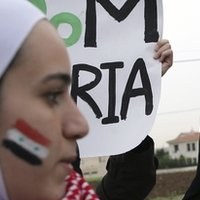![]()
Sat, Jan 29, 2011 | The Rubin Report | By Barry Rubin

Egyptian demonstrators demanding the ouster of President Hosni Mubarak gather on the statue of Alexander the Great in Alexandria. (AFP)
The Egyptian Revolt: I’m Worried that Others Aren’t Worried
An interview:
1) How do you judge the Egyptian protests?
It is tempting to see this as a revolution that will bring down the regime. But Egypt is not Tunisia. And while the demonstrations are passionate it is not clear that the numbers of participants are huge. If the elite and the army hold together they could well prevail, perhaps by removing Mubarak to save the regime. We should be cautious in drawing conclusions.
2) Do you see the threat of an Islamist takeover by the Ikhwan?
So far the uprising has not been led by the Muslim Brotherhood. But it is the only large organized opposition group. It is hard to see how it would not be the leading force after a while. The leadership would have to decide that it is facing a revolutionary situation and that this is the moment for an all-out effort. But if it does so and fails there will be a terrible repression and the group will be crushed. It appears that the Brotherhood is joining the protests but has not made its basic decision yet. In the longer term if the regime is completely overthrown I do believe the Brotherhood will emerge as the leader and perhaps the ruler of the country.
3) Do you see any chances that Egypt will witness the same model of Iran of 1979, the democratic protests followed by an Islamist rule?
Absolutely yes. On one hand, so far they lack a charismatic leader. On the other hand, alternative non-Islamist leadership is probably weaker than it was in Iran. Remember also that the Iranian revolution went on for almost a year, with the Islamists emerging as leaders only after five or six months. Many experts predicted that moderate democrats would emerge as rulers and said an Islamist regime was impossible but that isn’t what happened. I very much hope I am wrong.
4) How the Arab status quo can be reformed and changed without letting the Jihadist fanatics take power? Is it possible to have democracy and liberalism?
One would need strong leaders, strong organizations, an ability to repress opposition, a clear program, and unity, among other things. None of this is present on the moderate democratic side. Again, I wish it was otherwise. More than any other country, reformers–though not all of them–have believed they can work with and then manipulate the Islamists. That seems like a mistake.
The chances for democracy and liberalism are different in every country. Tunisia has a good chance because there is a strong middle class and a weak Islamist movement. But in Egypt look at the numbers in the latest Pew poll.
In Egypt, 30 percent like Hizballah (66 percent don’t). 49 percent are favorable toward Hamas (48 percent are negative); and 20 percent smile (72 percent frown) at al-Qaida. Roughly speaking, one-fifth of Egyptians applaud the most extreme Islamist terrorist group, while around one-third back revolutionary Islamists abroad. This doesn’t tell us what proportion of Egyptians want an Islamist government at home, but it is an indicator.
In Egypt, 82 percent want stoning for those who commit adultery; 77 percent would like to see whippings and hands cut off for robbery; and 84 percent favor the death penalty for any Muslim who changes his religion.
Asked if they supported “modernizers” or “Islamists” only 27 percent said modernizers while 59 percent said Islamists:
Is this meaningless? Last December 20 I wrote that these, “Horrifying figures in Egypt…one day might be cited to explain an Islamist revolution there….What this analysis also shows is that a future Islamist revolution in Egypt and Jordan is quite possible.”
5) What kind of threat the Muslim Brotherhood network pose to Israel and the Western democracies?
In power? A huge threat: renewed warfare, overwhelming anti-Americanism, efforts to spread revolution to other moderate states, a potential alignment with Iran and Syria (though that might not happen), incredible damage to Western interests. In short, a real disaster. What shocks me is that Western media and experts seem so carried away by this movement they are only considering a best-case outcome. As I suggested, I would prefer things were otherwise but I am deeply worried and one of the things I’m worried about is that others don’t seem to be worried.
About the author,
Barry Rubin is director of the Global Research in International Affairs (GLORIA) Center and editor of the Middle East Review of International Affairs (MERIA) Journal. His latest books are The Israel-Arab Reader (seventh edition), The Long War for Freedom: The Arab Struggle for Democracy in the Middle East (Wiley), and The Truth About Syria (Palgrave-Macmillan). The website of the GLORIA Center is at http://www.gloria-center.org and of his blog, Rubin Reports, http://www.rubinreports.blogspot.com.



 RSS
RSS










The Egyptian #Revolt: I’m Worried that Others Aren’t Worried | #Egypt #Islamism http://j.mp/gYes6Z
RT @CrethiPlethi: The Egyptian #Revolt: I’m Worried that Others Aren’t Worried | #Egypt #Islamism http://j.mp/gYes6Z